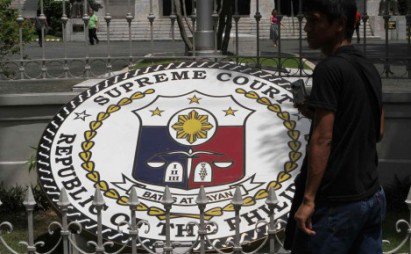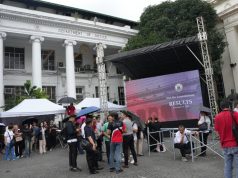Atty. Mel Sta. Maria is the Dean of the Far Eastern University Institute of Law and Professor at the Ateneo de Manila School of Law.
Are we witnessing the early signs of the constitution’s evisceration? Did the Supreme Court lay the legal foundation for the undue expansion of Martial Law to other parts of the country? Have the seeds of authoritarianism been judicially planted?
And just like the criticism on the Supreme Court that legitimized dictator Ferdinand Marcos’ Martial Law regime in 1973, did the present Supreme Court make itself a willing partner emasculating our democratic institutions?
Justice Oliver Wendell Holmes, in his magnum opus “the Path of the Law” and referring to the courts , said, “one may criticize even what one reveres.”
In the Supreme Court’s decision on martial law in Mindanao, I criticize an institution I revere. With all due respect, I believe that the votes of the majority of the associate justices have effectively defanged the institution of its prerogatives in exercising its role in the check-and-balance system under the Constitution.
It is a sad narration for constitutionalism.
Let me explain.
First, the Supreme Court, through Associate Justice Mariano Del Castillo, in effect, declared that accuracy is not an important integral part of the sufficiency-requirement mandated by the Constitution in justifying the declaration of Martial Law. Specifically, the highest tribunal said:
“After all, the Court’s review is confined to the sufficiency, not the accuracy, of the information at hand, during the declaration (of Martial Law) or suspension (of the writ of habeas corpus).”
This is a dangerously sweeping statement.
Dichotomizing “sufficiency” and “accuracy” is a grievous error. These two are inseparable. Necessarily, accuracy of data is a condition precedent to arrive at authentic “sufficiency.” Otherwise, the so-called “sufficiency” may be fake, just like fake news. To be sure, the standard required is “sufficiency of the factual basis,” not merely of the “information at hand.” “Factual basis” imperatively connotes truthfulness of the events. “Alternative facts” have no place in appreciating the gravity of the circumstances or purpose of declaring Martial Law.
Second, the Supreme Court in effect said that there is no limitation of the power of the President to determine the extent of the territorial bounds of Martial Law. The Supreme Court pronounced
“clearly, the Constitution grants to the President the discretion to determine the territorial coverage of martial law and the suspension of the privilege of the writ of habeas corpus. He may put the entire Philippines or only a part thereof under martial law.”
It summed up by declaring:
“Thus, the Constitution imposed a limitation on the period of application, which is 60 days, unless sooner nullified, revoked or extended, but not on the territorial scope or area of coverage; it merely stated ‘the Philippines or any part thereof,’ depending on the assessment of the President.”
Our Constitution is the organic document prescribing boundaries of the exercise of governmental powers. The constitutional spirit must always be one of delimitation and not expansion.
It is a fundamental mistake to construe presidential authority as an absolute one merely based, among others, on omissions in the constitutional text. But this is exactly the impression created by the Supreme Court pronouncement. To allow the geographical expanse of military rule to depend on the President’s assessment — which does not principally take in consideration the “accuracy” of the “information at hand” — is opening the floodgates to arbitrary, capricious and whimsical decisions.
This is threateningly ruinous to our democratic system and ultimately to the lives of our people. Constitutional rules must always be construed “not of the letter but of the spirit; for the letter kills but the spirit gives life.”
Third, the Supreme Court seemed to have virtually abdicated not only its power of review on the imposition of martial law but, more fundamentally, also its role as a check against the unconstitutional exercise of executive power.
The court rhetorically said:
“The Court can act only within the confines of its power. For the Court to overreach is to infringe upon another’s territory. Clearly, the power to determine the scope of territorial application belongs to the President. The Court cannot indulge in judicial legislation without violating the principle of separation of powers, and, hence undermining the foundation of our republican system.”
But this is not a case of “overreach.” This is not even a case of “judicial legislation.” This is a case of check-and-balance, which is the true “foundation of (the) republican system.”
Such is the imperative of a democracy and governmental accountability. The Constitution deliberately created three great branches of government (the executive, the legislative and the judiciary) precisely to disperse governmental powers. The configuration is designed so that each branch can check any abuse committed, being committed or may potentially be committed by the other great branches.
Concentrating too much power or almost all the powers of government only in one branch — directly, vicariously, through connivance or by judicial decisions — will lead to a monarchial and despotic kind of governance.
These are very trying times. Many in the House of Representative and in the Senate continue to abdicate their duty to convene a joint session of Congress to precisely debate the declaration of Martial Law. And now many are anxious of the Supreme Court. Who, what agency, is then left?
As an answer, I quote one of my favorite constitutional jurists, former Associate Justice William A. Brennan of the United States Supreme Court. He said:
“If our free society is to endure, and I know it will, those who govern must recognize that the Framers of the Constitution limited their power in order to preserve human dignity and the air of freedom which is our proudest heritage. The task of protecting these principles does not rest solely with nine Supreme Court Justices, or even with the cadre of state and federal judges. We all share the burden.”
Lastly, should we stop criticizing the Supreme Court decision?
The answer is “no” if we think it is wrong.
And in this regard, that burden is for us to continue to speak up against what we believe are fundamental mistakes.
Supreme Court decisions should not be immune from critical debate and its magistrates from legitimate animadversions. This is especially necessary considering that it is the only branch of government that decides in close chambers and whose decisions affecting the whole nation are made by men and women without direct mandate from the people.
Only in this way can we make these Supreme Court justices, who get their salaries from the people’s taxes, feel accountable to the public. We must remember that they are fallible human beings like all of us. They too can err and be unduly influenced. Justice Brewer, former US Supreme Court Justice, said:
“Justices should be the objects of constant watchfulness by all, and their judgments subject to the freest criticism. The time is past in the history of the world when any living man or body of men can be set on a pedestal and decorated with a halo. True, many criticisms may be, like their authors, devoid of good taste, but better all sorts of criticism than no criticism at all. The moving waters are full of life and health; only in the still waters is stagnation and death.”










